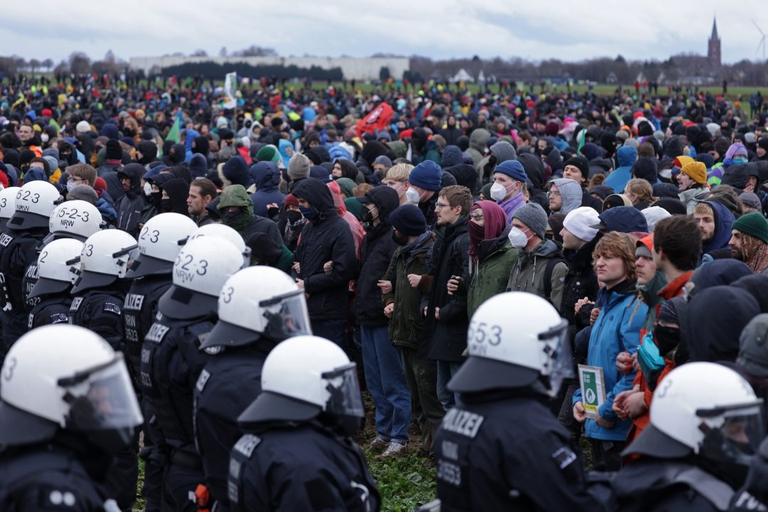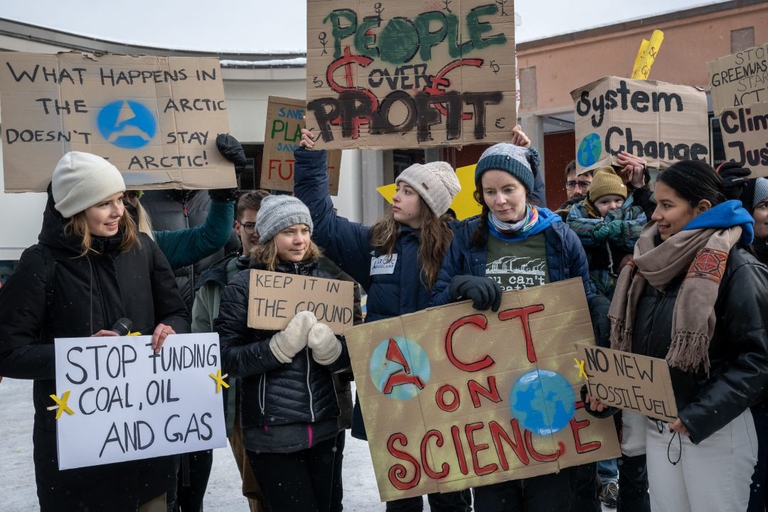
South African court dismisses a major lawsuit by 140,000 Zambian women and children against Anglo American for Kabwe lead poisoning. A setback for affected communities enduring the lasting impact of lead contamination.
First the protests in the mud at Lützerath, then a more traditional appearance at Davos. In January, Greta Thunberg brought focus to where it matters most.
Earlier in January, Swedish climate activist Greta Thunberg had an extremely busy week. After months of work out of the spotlight, Thunberg made appearances in two of the most symbolic places for the ongoing climate disaster. First in Lützerath, Germany, the village that is being demolished to make way for a coal mine, then in Davos, Switzerland, where the world’s wealthiest and most powerful people are meeting for the annual World Economic Forum, with the power to shape the planet’s future.
From being detained by police and dragged away in mud-covered boots to giving speeches on stage at WEF, it only took Greta Thunberg a few hours to breathe new life into a movement, the global environmentalist struggle, which needed it more than ever.
Greta Thunberg visited Lützerath, Germany to join protesters who were occupying the village, attempting to stop its destruction to make way for a lignite coal mine.
During the protest on January 14th against the mining project led by German mining giant RWE, Thunberg was detained by police, who shoved the young activist and moved her away from the protest site. On 17th January, the scene was repeated, with even more vehement tactics. The police lifted Thunberg off her feet and dragged her away while she was attending a sit-in near Garzweiler, the site of one of the currently operational mines, which is set to expand and absorb the area that includes Lützerath. Thunberg was detained alongside other activists and ID‘d, with her police photographs immediately being shared around the world and gaining iconic status.
During her time in North-Rhine Westphalia, Thunberg slated Germany’s decision (made by a Greens-led government) to continue fossil fuel mining as “ridiculous”, calling it proof that the changes needed to combat the climate emergency will only come from below, not from above.
Two days after being detained and released in Germany, Greta Thunberg appeared in Davos, Switzerland, where the World Economic Forum – a meeting of the world’s wealthiest and most powerful – was taking place. Thunberg, whose presence had not been announced but gained a lot of attention, appeared alongside other activists like Vanessa Nakate, Helena Gualinga, and Luisa Neubauer, the leader of Fridays for Future Germany.
“The people we should listen to are not here. In Davos there are the people who are fuelling the destruction of the planet, the ones at the heart of the climate crisis, who continue to invest in fossil fuels,” Thunberg decried from one of the spaces occupied by activists and environmental associations a few steps away from the WEF meeting halls. The Swedish activist launched an appeal that also has to do with the village of Lützerath, asking for a stop to the new extraction of oil, gas, and coal. Thunberg also presented a petition with 900,000 signatures accusing energy company managers of having tricked the world’s population for decades and demanding a change of direction.
Activists who came to Davos alongside Greta Thunberg also met with Fatih Birol, Executive Director of the International Energy Agency (IEA), who recognised the importance of increased attention to climate change.
Later in January, police managed to definitively clear out the environmental activists from Lützerath. Meanwhile, the powerful in Davos continued to meet and determine the fate of the planet. However, these two facts do not mean that Greta Thunberg’s actions were not successful. In fact, the opposite is true.
Over the course of a few days, the Swedish activist first got her boots dirty and then risked getting a criminal record, taking a stand in the mud and (despite the militarisation) in German coal mining sites. Then she changed form, appearing in the hyper-institutional halls of the Davos forum and decrying its failures with speeches that garnered much more attention than those by the leaders gathered in the Swiss town. With her actions in early 2023, Greta Thunberg managed to breathe new life into a movement that had seemed weakened in recent times.
On the one hand, the Covid-19 pandemic and lockdowns had affected attendance at in-person protests and demonstrations while, on the other hand, the radical nature of some actions by environmentalist groups, from road blockades to attacks on art, made many people turn up their noses. Thunberg, with her recent public appearances, took back the reins of a generational movement and reminded us of the urgency of this battle. She showed the importance of grassroots mobilisation and was able to give greater credibility even to those more radical actions that are less understood and accepted by civil society.
Thunberg was also accompanied by the most important organisations in the fight against climate change, which in Lützerath saw tens of thousands of people make a show of resistance that had not been witnessed in a long time. Thus, the feeling is that a new season for environmental activism has dawned, whose source of energy comes, in no small part, from the charisma and strong will of Greta Thunberg.
Siamo anche su WhatsApp. Segui il canale ufficiale LifeGate per restare aggiornata, aggiornato sulle ultime notizie e sulle nostre attività.
![]()
Quest'opera è distribuita con Licenza Creative Commons Attribuzione - Non commerciale - Non opere derivate 4.0 Internazionale.
South African court dismisses a major lawsuit by 140,000 Zambian women and children against Anglo American for Kabwe lead poisoning. A setback for affected communities enduring the lasting impact of lead contamination.
The latest updates on the strikes and events being held around the world for the global day of climate action on 25 September.
Licypriya Kangujam is raising her voice against climate inaction: her campaigning even led two Indian states to adopt climate change as a school subject.
Controversial African land deals by Blue Carbon face skepticism regarding their environmental impact and doubts about the company’s track record, raising concerns about potential divergence from authentic environmental initiatives.
Majuli, the world’s largest river island in Assam State of India is quickly disappearing into the Brahmaputra river due to soil erosion.
Food imported into the EU aren’t subject to the same production standards as European food. The introduction of mirror clauses would ensure reciprocity while also encouraging the agroecological transition.
Sikkim is a hilly State in north-east India. Surrounded by villages that attracts outsiders thanks to its soothing calmness and natural beauty.
Sikkim, one of the smallest states in India has made it mandatory for new mothers to plant saplings and protect them like their children to save environment
Chilekwa Mumba is a Zambian is an environmental activist and community organizer. He is known for having organized a successful lawsuit against UK-based mining companies.









